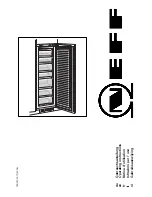
Important Safety Instructions
6
818 22 23-00/1
themselves into the appliance (danger of suffocation!) or place
themselves into other life-endangering situations.
• Children often do not recognise the dangers involved with household
appliances. Please provide for the necessary supervision and do not
allow children to play with the appliance!
Daily Operation
• Containers with flammable gases or fluids can develop leaks through
contact with the cold. Danger of explosion! Do not store containers
with flammable substances, such as aerosol cans, refill cartridges for
cigarette lighters etc. in the appliance.
• Bottles and cans may not be placed in the freezer compartment. They
can burst when the contents freeze - or even explode if the contents
contain carbonic acid! Never place sodas, juices, beer, wine,
champagne etc. into the freezer compartment. Exception: Spirits with
high alcohol content may be stored in the freezer compartment.
• Do not place ice cream or ice cubes directly from the freezer
compartment into the mouth. Very cold ice can freeze to the lips or
tongue and cause injury.
• Never touch frozen goods with wet hands. Hands can freeze to the
goods.
•
Warning
- Do not operate any electrical appliances in the appliance
(e.g. electric ice cream makers, mixers etc.).
•
Warning -
Do not cover or obstruct the ventilation openings as this
will impair the operation of the appliance.
• Before cleaning the appliance switch off and remove the plug from
the mains, or switch off or turn out the circuit breaker or fuse.
• Placing frozen goods on the top of the appliance can lead to the
accumulation of condensation on the top panel through contact with
the cold. Electronic components are housed within this top panel. If
water should drip onto these components, the appliance could be
damaged by a short circuit. For this reason do not place frozen goods
on top of the appliance.
• When unplugging always pull the plug from the mains socket, do not
pull on the cable.
In case of malfunction
• If a malfunction should occur at the appliance, refer first to the
section "What to do if ..." in these operating instruction. If the
instructions in this section are not sufficient, do not undertake any
further work on your own.







































